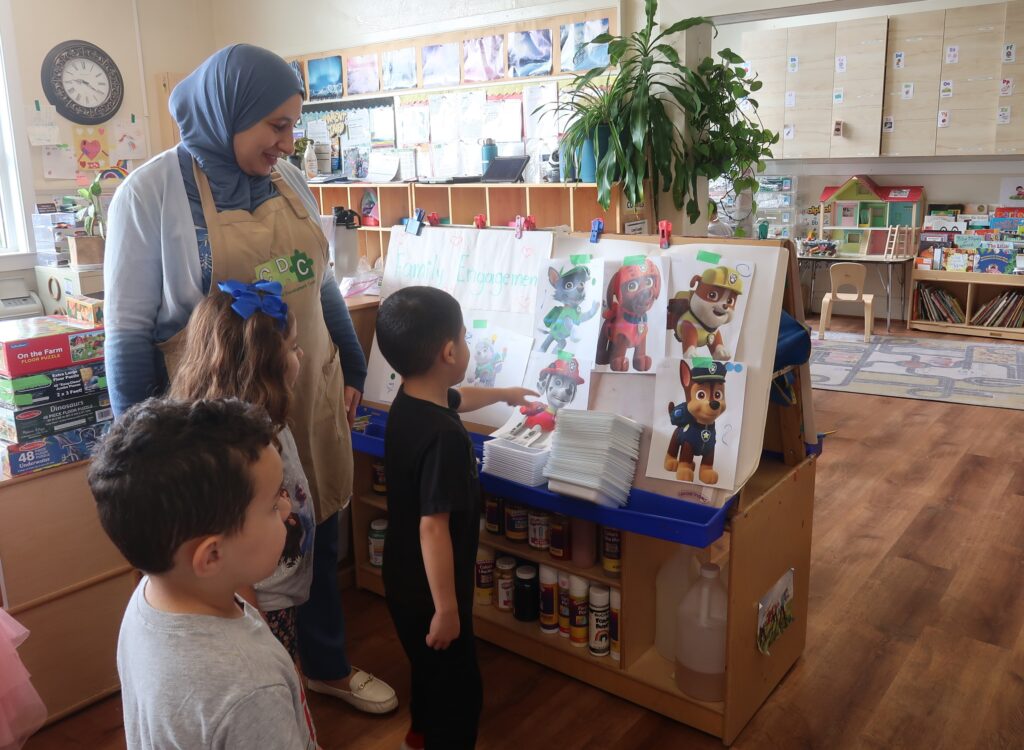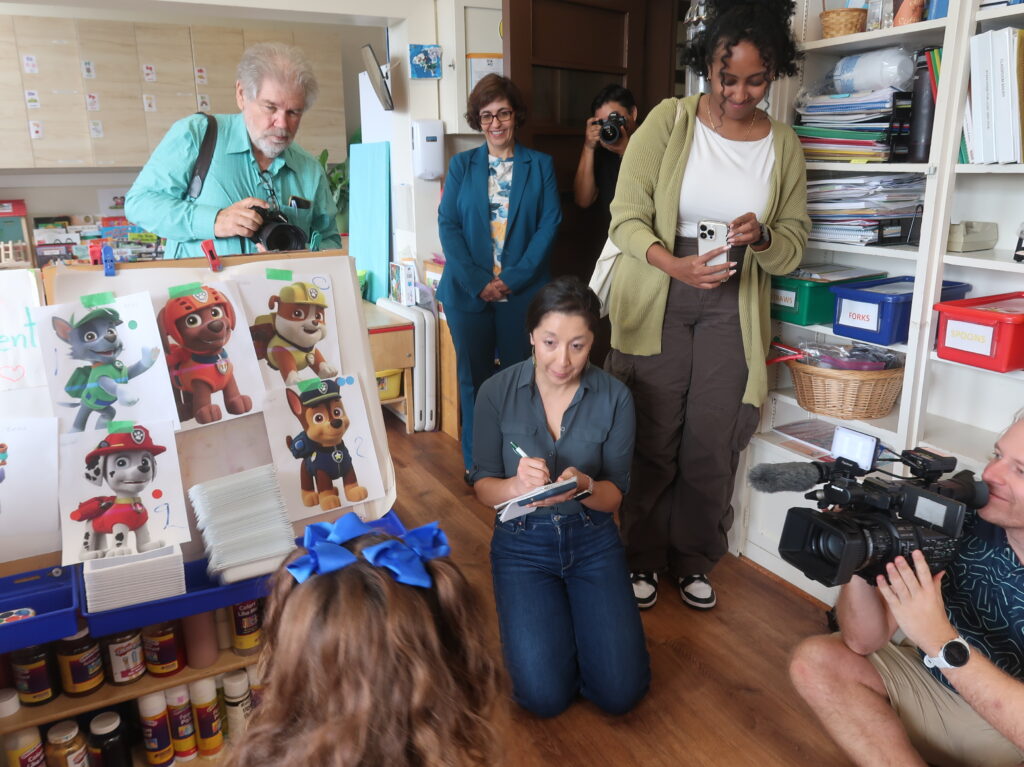Lessons in democracy start early

With all the political divisiveness and disrespect in the country, Isabel Ballivian, executive director the ACCA Child Development Center, believes it’s critical to educate young children about democratic principles and civility.
The CDC, an early education program that serves about 200 children, many from lower-income immigrant households, is located at 7200 Columbia Pike in Annandale.
As the U.S. gears up for Election Day on Nov. 5, Ballivian created a democracy program to teach 3 and 4-year-olds about voting by having a primary and election focused on their favorite characters in the Paw Patrol cartoon show. Members of the Paw Patrol are dogs who carry out rescue missions to keep their community safe.
The Associated Press visited the CDC on Sept. 19 to report on the school’s democracy project.

Pictures of the Paw Patrol characters who made it through the primary voting were posted on a wall, and kids placed stickers on their favorites. Skye, the helicopter pilot, got the most votes.
When some children were upset that their favorite candidate didn’t win, their teacher encouraged them to contribute more drawings and do a better job of campaigning next time. The voting process also covered basic math skills.
Ballivian spoke about how disheartening it is to see the news and how “disrespect has become a way of communicating.”
“We need to express ideas that are respectful and that bring us together,” Ballivian said. “If we start with young children, we can build a better future with leaders who are thoughtful.”
“When you do this right, children will be less likely to become violent and engage in self-destructive behavior,” she said. “Early childhood sets the stage for everything that happens later.”


Excellent idea.
At 70-plus years old, I feared I would die without hope for the future of our democracy and nation. However, after reading this article, I now believe there is still hope—if we educate our youngest citizens about the fragile yet precious gift of living in the U.S. and what it takes to thrive in a democracy. I recall from my elementary school civics classes that Ben Franklin said, “A republic, if you can keep it,” emphasizing the importance of active citizen engagement in the democratic process. Preserving our form of government requires dedication, including negotiation, discussion, and even heated debates, but also respect. Ultimately, after each election, we must unite as a nation that shares common ideals, guided by our living Constitution and Bill of Rights. This is not about Democrats or Republicans; it’s about we the people. God bless this incredible idea!
Also, let’s teach them to be proud of being Americans. We can’t talk about common goals or unity, if we all do not believe in basic common principles.
It’s not about democracy, it’s about illegal immigration. The level of stupidity on this blog is astounding.
Sean, you can’t be serious? The vast majority of these young children were more than likely born here, which makes them U.S. citizens. This has nothing to do with their parents condition. I think we all want children to love our country and learn about the basics of how it works, and how to preserve it. I served in Vietnam, and I fought alongside people of all creeds and colors. All I cared about is if they had our uniform on and had my back. I would have gladly died for a Hispanic, Black, Jew or gentile–or even you Sean. That’s what makes us Americans!
I mean the organization is a thinly-veiled activist group, garnering positive press by doing things that seem impossible to argue against. Akin to the Proud Boys doing a food drive.
You’re not the only combat vet here. And thanks for your service.
You’re right. This idea seems good. We need to be a melting pot. On my mom’s side, I’m black, French, and Sioux, and my dad was Irish and Italian. Although I’m proud of my origins, I’m American first, and that’s something our new generations need to understand., or else, we will always live divided. Also, unless you look like a Native American, all our ancestors have immigrated from somewhere. We must never forget that.
It’s all good. But it’s only one program and a very small number of children. How about thinking of a scaling this up at the very least throughout all fairfax daycares.
My daughter attends this program, and I’m so grateful for the awesome work they do. We’re originally from Puerto Rico, and my grandfather, dad and uncles have served this county in wars since Korea. My brother is now in the Marines. I guess that makes us as American as apple pie, but today it would seem that is not enough for people like Sean. By the way, we have always been legal but that fact doesn’t make me better than anyone else. And yes, we need to teach Sean and all kids what truly makes this county great.
Education is the great equalizer.
There are several ways to teach civics to preschoolers, including:
Using age-appropriate language: Avoid complex jargon and technical terms.
Teaching basic concepts: Use real-life examples to explain democracy, voting, and the separation of powers.
Focusing on values: Help children understand the importance of values like respect, responsibility, and fairness.
Encouraging participation: Get children involved in civic life through volunteering, attending events, or writing letters to elected officials.
Using games and activities: Make learning fun with games like mock elections or citizenship challenges.
Being a role model: Demonstrate responsible and engaged citizenship.
Using picture books and animated shows: These can help explain basic concepts like democracy and voting.
Reading and discussing historical documents: Introduce government in the context of patriotic holidays and early American history.
Talking about social responsibility: Encourage sharing and discuss how actions affect others.
Taking children to the voting polls: Explain the importance of voting.
Volunteering with children: Demonstrate how making a difference in the community can knit people together.
Talking about diversity: Exposing children to the struggles and inequities in the world can help them develop compassion.
This is just crazy. Who runs this program?